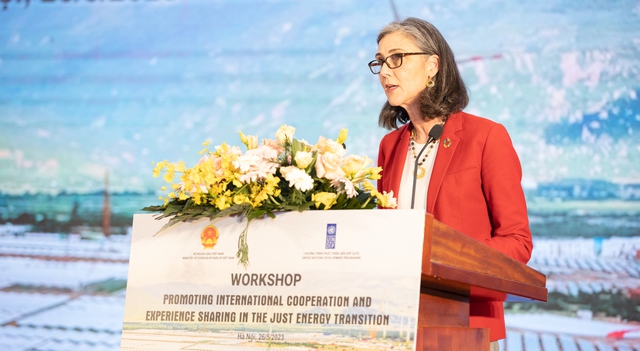Workshop held to enhance understanding for sustainable just energy transition
VGP - An international workshop was organized in Ha Noi on May 26 to enhance cooperation, encourage knowledge transfer and promote experience sharing in just energy transition.

UNDP Resident Representative in Viet Nam Ramla Khalidi - Photo: VGP/Thuy Dung
The event was co-hosted by the Ministry of Foreign Affairs of Viet Nam, and the United Nations Development Program (UNDP).
The workshop drew the participation of senior government representatives from the three countries with Just Energy Transition Partnerships (JETPs)–South Africa, Indonesia and Viet Nam–as well as representatives from another seven developing countries with a strong interest in the energy transition, to create a forum for them to learn from one another.
The workshop also brought together representatives from the International Partners Group (IPG), the Glasgow Financial Alliance for Net Zero (GFANZ), development partners, key Vietnamese ministries and representatives from 63 provinces, and other stakeholders, to promote dialogue and enhance understanding for an accelerated and sustainable just energy transition.
This high-level event sought to strengthen international coordination, particularly emphasizing South-South collaboration in the just energy transition. Furthermore, it aimed to promote mutual understanding on finance among diverse stakeholders, including donors, financing entities, the private sector, and governments.
The workshop also emphasized the importance of the "just" aspects of the energy transition, and ambitions to support energy transition efforts across nations while advancing national energy transition agendas and goals.
Given the imperative of limiting the global average temperature increase to 1.5°C above pre-industrial levels as the Paris Agreement mandates, the workshop underlined the need for innovative, equitable, and sustainable approaches to decarbonize economies and achieve climate and development objectives.
To realize the just energy transition, developing countries require multi-faceted international support in the form of finance, technology, knowledge and capacity building to effectively decarbonize their economies and establish low-carbon development pathways.
Addressing the event, UNDP Resident Representative in Viet Nam Ramla Khalidi said that climate and innovative finance–both domestic and foreign, and both private and public-is of paramount importance in the energy transition.
The energy transition needs to be fair and equity-driven for developing countries to transition sustainably to low-carbon economies and establish climate-resilient trajectories, while realizing their sustainable development objectives, she added.
The energy transition must be just and inclusive for workers, local communities, and affected people through creation of new economic opportunities, job creation, and reskilling, capacity-building and enhancing social safety nets, shared UNDP Resident Representative in Viet Nam./.
